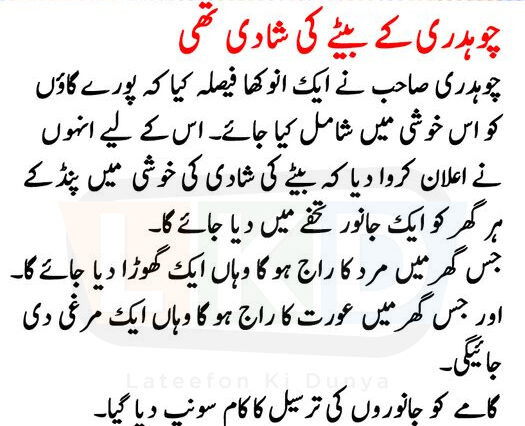In a peaceful village nestled in the heart of the countryside, where rolling fields of green stretched as far as the eye could see, there lived a wealthy and respected man named Chaudhry Sahib. Chaudhry Sahib was not only known for his riches but also for his generosity and fairness, which had earned him the love and respect of everyone in the village.
One day, an event of great significance was announced: Chaudhry Sahib’s only son was getting married. The entire village buzzed with excitement, for the Chaudhry family’s celebrations were always grand and memorable. However, this time, Chaudhry Sahib wanted to do something truly special, something that would involve the entire village in his joy.

After much thought, Chaudhry Sahib made a unique and surprising decision. He called for a village meeting, where he announced that in honor of his son’s wedding, every household in the village would receive a gift. The gift would depend on one simple question: “Who is the head of the household?”
“If the man is the head,” Chaudhry Sahib explained, “the family will receive a horse. But if the woman is the head, they will receive a chicken.”
This declaration sparked a mixture of excitement and curiosity throughout the village. Everyone began to wonder what they would receive, and more importantly, how they would be perceived by others based on the gift they got. For in those times, the concept of household leadership was a matter of pride and prestige, particularly among the men of the village.
To carry out this task, Chaudhry Sahib entrusted Gama, a trusted and loyal servant who knew every nook and cranny of the village, with the responsibility of distributing the gifts. Gama was a man of simple means but great wit, and he approached the task with a mixture of amusement and seriousness.
The first house Gama visited belonged to an old, respected couple. As he entered their home, the husband and wife sat across from him, both eager to see what gift they would receive. Gama, following Chaudhry Sahib’s instructions, asked, “Who is the head of the household? Who makes the decisions in this home?”
Without hesitation, the husband replied with pride, “I am the head of this household.”
Gama nodded and said, “Very well. Chaudhry Sahib’s horses are all noble and strong. We have three left: one black, one red, and one white. Which one would you prefer?”
The old man’s eyes lit up as he thought about riding a majestic white horse through the village. “I’d like the white one,” he said confidently.
But before Gama could respond, the wife, who had been quietly listening, suddenly spoke up. “No, no,” she said firmly. “We will take the black one. I’ve seen it before; it has a beautiful white mark on its forehead. It’s much more handsome than the others.”
The old man hesitated, then sighed. “Alright, we’ll take the black one.”
Without missing a beat, Gama reached into the sack he carried and pulled out a chicken, handing it to the woman. “Here you go,” he said, “a fine chicken for your household.”
The old man looked bewildered, but before he could say anything, Gama had already moved on to the next house, leaving behind a couple whose pride had been gently but firmly deflated.
As Gama made his way through the village, this scene repeated itself over and over again. In every household, Gama would ask who the head of the household was, and in almost every case, the man would proudly claim the role. But as soon as the wife intervened, often with a suggestion that differed from her husband’s, Gama would hand them a chicken and move on.
By the end of the day, Gama had distributed chickens to nearly every household in the village. There was not a single horse left in his sack, for not a single man had been able to assert his authority without the input—or rather, the decision—of his wife.
When Gama returned to Chaudhry Sahib, he was greeted with a knowing smile. “So, how did it go?” Chaudhry Sahib asked.
Gama chuckled. “Chaudhry Sahib, it seems that the women of this village have a lot more say than the men would like to admit. I had to give out chickens in every house.”
Chaudhry Sahib laughed heartily, a deep, satisfied laugh that echoed through his grand hall. “Ah, Gama, you’ve done well. This was exactly what I expected. You see, in our village, men may boast about their authority, but we all know who truly runs the household.”
News of the village’s chicken population explosion quickly spread, and the story became the talk of every gathering, every market, and every home. The men, though a bit embarrassed at first, soon found humor in the situation, for it was a gentle reminder that their wives played an indispensable role in their lives.
And so, the tale of Chaudhry Sahib’s wedding gifts became a cherished story, passed down from generation to generation. It was a story that celebrated not only the love between a husband and wife but also the subtle, often unspoken ways in which decisions are made within a family. It was a lesson in humility, pride, and the true meaning of partnership.
As for Chaudhry Sahib’s son, his wedding was indeed grand, and the entire village celebrated with joy. But the most memorable part of the celebration was not the lavish feast or the beautiful decorations, but the story of the roosters and the village of pride—a story that lived on long after the festivities had ended.
Years later, whenever a young couple would marry, the elders of the village would smile and say, “Remember the tale of the chickens? It’s not about who rules the house, but about who cares for it. A true partnership is when both the horse and the chicken walk side by side.”
And so, the village thrived, not because of the wealth of its land but because of the wisdom of its people—wisdom that taught them to value each other, to listen, and to laugh together, even in the most unexpected situations.








